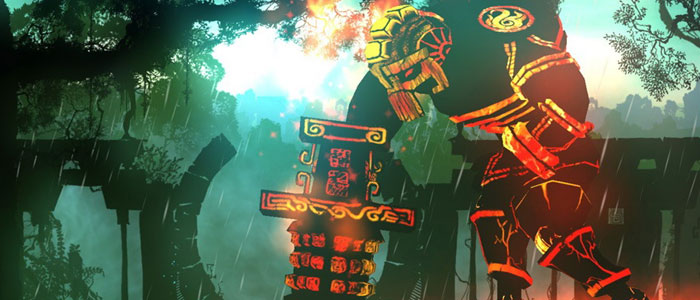[tab:Review]
I think my colleague best summed up Outland when we were playing a co-op game; “why is no one talking about this game?” Outland is the latest from Housemarque, the guys that brought you Super Stardust HD and Dead Nation. Their latest adventure combines some unlikely game types, including a little Ikaruga and even some Metroid-vania, to create one of the most polished and enjoyable experiences I have had the pleasure of downloading. To reiterate what my cohort muttered during our session, if you have not heard of Outland, it is high time you discovered its brilliance.
For a platformer with so much aesthetic beauty, the narrative kind of takes a back seat to the action. The general gist is that there are two sisters, one light and one dark of course, who you are on course to destroy the world. The intermissions between each level are reminiscent of subtle poetry that drives the story forward. The voiceover work is excellent and makes it feel all the more epic regardless of what he is saying. There is also harmony to be had between you and nature, explaining the powers you acquire along the way.

Speaking of powers, this is where Outland derives its subtle brilliance. In the beginning, you only have the ability to jump. As you progress you are spoon-fed multiple abilities that change the game up and give you access to new areas that you passed along the way. This is where the Metroid-vania aspect comes into play. You constantly see areas you cannot access without specific powers giving you reason to trek back through visited regions to collect Marks of the Gods and, of course, more coins to spend on upgrading your health.
The powers you collect are what make the adventure so much fun, especially once you acquire your light and dark abilities. This is where the Ikaruga reference comes in. Everything in Outland is based on two colors, red and blue. Once you obtain both abilities, you can switch between them on the fly by simply tapping the bumper. There are fountains that spew bullets, for lack of a better word. These projectiles are colored, but when you match their hue, you can absorb them without taking damage. It is a simple concept, but in practice it becomes a challenge when you enter a room filled with fountains of both colors, and your goal is to reach the other side intact.
Switching back and forth creates a symphony of response time that, when pulled off, truly gives you a sense of mastery. It also helps that the game plays as smooth as butter. When you die, you truly know it was of your own doing. As you collect more powers the power bar is introduced. This requires a recharge before expelling some of your more powerful attacks. To fill this bar you have to take down enemies, which also operate on the polarity idea. Red enemies are more damaged by blue attacks, but their projectiles are absorbed making combat just as poetic as the platforming.
The single player game is meaty, taking you through countless labyrinths and tossing some of the most inventive bosses at you in recent memory. These range from your standard “memorize the pattern” foes to more creative uses of the polarity aspect. In addition, the game also offers a host of online options featuring co-op, which I was fortunate enough to partake in. Blasting through the main game with a buddy can provide more challenge than in single player, but also more rewarding as you figure out how to navigate certain areas more fluidly with both of you having access to light and dark powers. The one sore spot in co-op is that you do not share coins and collectibles. Whoever picks it up gets credit causing some deaths due to greed.

There are also co-op challenges that require you to work as a team in order to complete them in the time limit. Once unlocked you can go back to these and they provide some awesome challenges that definitely require communication. You can also blast through Arcade mode either single or co-op, which basically amounts to a speed run of the game. In addition to collecting Marks of the Gods and upgrading your character, there is ample content here to keep you coming back for more.
Outland is also gorgeous when it comes to visuals. The shadowy look of the levels really screams fantastic art direction. The boss designs are fantastic, and every level feels unique, which can be challenging when creating a platformer. One gripe on this front is in co-op. Both characters look strikingly similar even though one player has an aura glow around them. It can be confusing at times when trying to land accurate jumps. The sound is amazing in every aspect. The music really sets the mood, and as I mentioned earlier, the voiceover has a demanding tone that forces you to listen. Playing this through some quality surround headphones or a nice setup is a must.
Outland is a phenomenal game that doesn’t so much innovate, as much as it perfects. The polarity aspect is genius and the platforming is top-notch. Adding in co-op only sweetens the deal, making this a must-own title. Outland just seems to do everything it does extremely well, and what we end up with is a symphony of flawless game design that everyone needs to experience.
Review copy provided by publisher. Primary play on Xbox 360.
[tab:Screenshots]
[tab:END]
